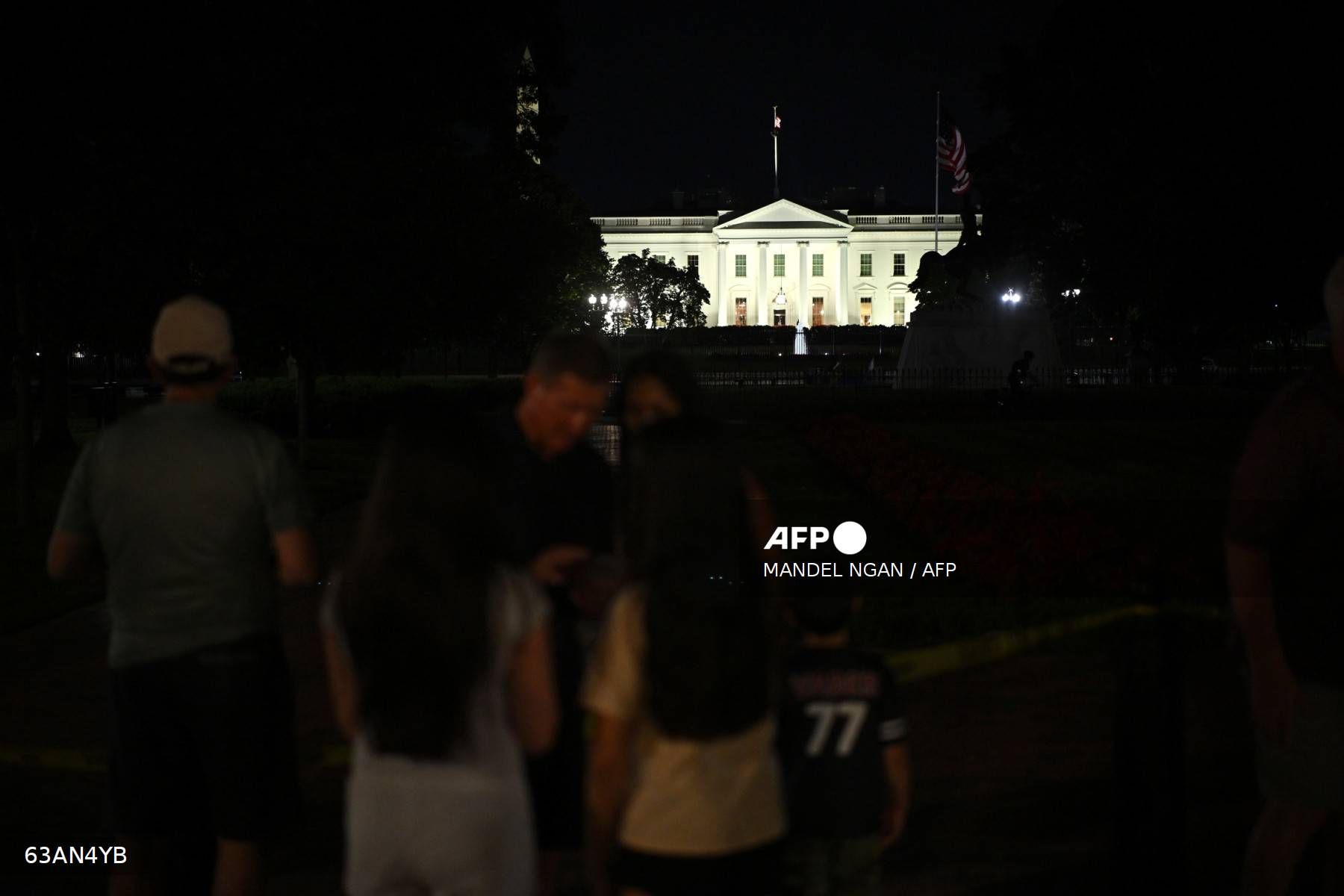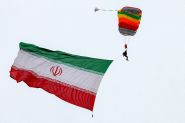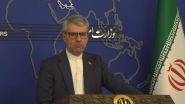- Home
- Middle East
- Global Leaders React to U.S. Strikes on Iranian Nuclear Facilities

The White House is seen in Washington, DC, on June 21, 2025, following the announcement that the US bombed nuclear sites in Iran and before US President Donald Trump adresses the nation. ©MANDEL NGAN / AFP
The recent U.S. strikes targeting three major Iranian nuclear facilities on Sunday morning have sparked a wave of varied and intense reactions across the globe, with governments, international organizations, and analysts expressing concern over the potential for further regional instability and the broader implications for global security.
Iran
Iranian President Masoud Pezeshkian condemned US strikes on nuclear sites, saying in his first response that the attack revealed Washington was "behind" Israel's military campaign in the Islamic republic.
"This aggression showed that America is the main factor behind the Zionist regime's hostile actions against the Islamic Republic of Iran," he said, according to IRNA news agency, adding that the United States acted after seeing Israel's "obvious inability".
Iran's Foreign Minister Abbas Araghchi condemned the US attacks as "outrageous" and said his country has a right to defend its sovereignty.
"The events this morning are outrageous and will have everlasting consequences," he posted on X, adding that the attacks were "lawless and criminal" behavior.
"In accordance with the UN Charter and its provisions allowing a legitimate response in self-defense, Iran reserves all options to defend its sovereignty, interest, and people," the foreign minister said.
Iran's atomic energy organization also called the US attacks "a barbaric act that violates international law."
"The Atomic Energy Organization of Iran assures the great nation of Iran... it will not let the path of development of this national industry (nuclear), which is the result of the blood of nuclear martyrs, be stopped," it said in a statement published by state media.
Russia
Russia said that it "strongly condemned" the United States's bombings of nuclear sites in Iran, calling the attacks "irresponsible" and a "gross violation of international law."
"It is already clear that a dangerous escalation has begun, fraught with further undermining of regional and global security," the Russian foreign ministry added in a statement.
France
President Emmanuel Macron urged Tehran to resume diplomatic talks as he spoke to Iranian counterpart Masoud Pezeshkian after US strikes on the country's nuclear facilities, the French presidency said.
"The president reiterated his call for the immediate release of our two hostages, de-escalation and the resumption of diplomatic talks," Macron's office said, referring to two French nationals held by Iran.
China
China's foreign ministry said it "strongly condemns" US strikes on Iran's nuclear sites, adding that they "escalate tensions in the Middle East."
"China calls on all parties to the conflict, especially Israel, to cease fire as soon as possible," the ministry said in a statement.
Yemen
Yemen's Houthi government said it supported a vow by its armed wing a day earlier to hit US ships in the Red Sea should Washington launch strikes on Iran.
"We affirm the Republic of Yemen's commitment to the armed forces' declaration that they were ready to target US ships and warships in the Red Sea," the government said in a statement after the United States launched attacks on Iran.
European Union
The European Union's top diplomat Kaja Kallas called for de-escalation and a return to negotiations after the United States carried out strikes on Iranian nuclear sites.
"I urge all sides to step back, return to the negotiating table and prevent further escalation," Kallas wrote on X, adding Iran must not be allowed to develop a nuclear weapon and that EU foreign ministers will discuss the situation on Monday.
Saudi Arabia
Saudi Arabia expressed "great concern" after US air strikes on nuclear facilities in its giant neighbor Iran.
"The Kingdom of Saudi Arabia is following with great concern the developments in the sisterly Islamic Republic of Iran, represented by the targeting of Iranian nuclear facilities by the United States of America," the Saudi foreign ministry posted on X.
"It expresses the need to exert all efforts to exercise restraint, de-escalate, and avoid escalation," the statement added, urging the international community to increase attempts to find a political solution.
Israel
Israeli Prime Minister Benjamin Netanyahu strongly backed up the action, stating, “I thank President Trump, and strength brings peace.”
He called Trump’s decision “bold” and historic, claiming it “will change history” and “help guide the Middle East and beyond to a future of prosperity and peace.”
Israeli President Isaac Herzog thanked Donald Trump's United States, expressing hope that the action would help secure the swift release of the hostages still held in the Gaza Strip.
Hailing the strike as a triumph of "the principles of freedom, responsibility, and security," Herzog expressed his gratitude to Mr. Trump and the United States. "This courageous decision enhances the safety and security of the entire free world, and I hope it will lead to a better future for the Middle East and contribute to the urgent release of our hostages held captive in Gaza," the Israeli president added.
Qatar
Qatar, host of the biggest US military base in the Middle East, said it feared serious repercussions after US air strikes on nuclear facilities in Iran.
The foreign ministry "warns that the current dangerous escalation in the region may lead to catastrophic consequences at both the regional and international levels," a statement said.
"It calls on all parties to exercise wisdom and restraint and to avoid further escalation."
Oman
Oman, which was mediating nuclear talks between Washington and Tehran, strongly condemned US strikes on nuclear sites in Iran.
The Gulf sultanate "expresses deep concern, denunciation and condemnation of the escalation resulting from the direct air strikes launched by the United States on sites in the Islamic Republic of Iran," the official Oman News Agency said.
Bahrain
Bahrain, host of a major US naval base, told most of its government employees to work from home until further notice after American airstrikes on Iranian nuclear sites.
"A remote working system will be activated across ministries and government agencies, with a 70 percent work-from-home capacity," the official Bahrain News Agency said, citing "regional circumstances and current developments."
Iraq
Iraq warned that the US attacks on its neighbor Iran threaten peace and stability in the Middle East.
Iraq "expresses its deep concern and strong condemnation of the targeting of nuclear facilities" in Iran, government spokesperson Basim Alawadi said. "This military escalation constitutes a grave threat to peace and security in the Middle East and poses serious risks to regional stability," he added.
Germany
German Chancellor Friedrich Merz called for a swift return to diplomacy after the US struck three nuclear sites in Iran overnight, his spokesman said.
Iran must "immediately enter into negotiations with the US and Israel and find a diplomatic solution to the conflict," Merz said, according to his spokesman Stefan Kornelius.
The German government believes "large parts of Iran's nuclear program have been damaged by the airstrikes," Kornelius said.
UN
On the other hand, United Nations Secretary-General Antonio Guterres expressed deep concern over the attack, stating, “I am gravely alarmed by the use of force by the United States today,” calling it “a dangerous escalation in a region already on edge” and “a direct threat to international peace and security.”
Chile
Chilean President Gabriel Boric condemned the strikes, stressing that “attacks on nuclear facilities are prohibited under international law,” while Iran’s Atomic Energy Organization called the attacks “barbaric” and declared that their country “will not allow the development of this national industry [atomic energy] to be stopped.”
Read more



Comments